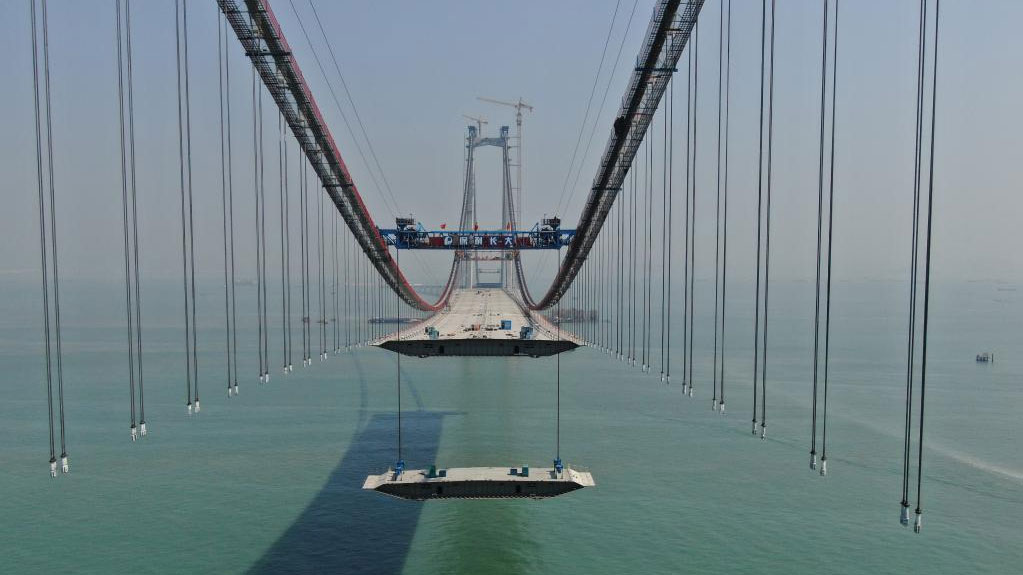Washington has money for wars overseas, not for railways at home -- critics
NEW YORK, Feb. 24 (Xinhua) -- The catastrophic toxic train derailment in Ohio has alerted Americans to the safety of their transport infrastructure, with repeated questions on social media asking why the government has money for wars around the world but not for railways at home.
"That was the biggest slap in the face," said Trent Conaway, the mayor of East Palestine when criticizing President Joe Biden for his surprise visit to Ukraine in a recent media interview.
The mayor said he was furious when finding out President Biden was in Ukraine giving millions of U.S. dollars away to people over there instead of helping victims of the train derailment. "That tells you right now he doesn't care about us," he complained.
A train carrying toxic chemicals derailed on Feb. 3 in East Palestine, Ohio. Leaked chemicals exploded, burned and discharged poisonous pollutants to the air, water and soil.
Related parties initially tried to hide up the seriousness of the accident, a reporter was even detained when trying to report the case. It was not widely known until two weeks later when videos of disastrous scenes of mushroom smoke, dead fish and sick animals were posted on social media.
The tragedy was followed by more train derailments in Michigan, Texas and Nebraska. The serial train accidents caused people to worry about the poor conditions of the country's railways. A video showing a train "dancing" on seriously twisted rail tracks connecting Ohio and Indiana became viral on social media, and some followers said railways at their homes are no better than that.
Stunned by videos showing the deteriorating conditions of railways, many followers wrote the United States really needs to renovate its infrastructure facilities instead of waging wars. Some satirized the government by saying that the country needs to redesign its railcar wheels to suit the twisted tracks.
Due to worn-out railways, train accidents have become so common that national media would not report unless there are fatalities. Statistics from the U.S. Department of Transportation show that from 1990 to 2021, there have been 54,539 train derailment accidents, which average 1,704 per year.
It's strange that there is money for wars but not for railways, and that's what the Americans are seeing. In 2023, the U.S. defence budget stands at a record high of 858 billion dollars, up by 8 percent from 2022. The United States spends more on national defense than the following nine countries combined, and it has also historically devoted a larger share of its economy to military expenditure than most countries in the world, including its key allies.
Watson Institute of Brown University estimated in its "Costs of War" report that Washington had spent over 8 trillion dollars on the post-9/11 wars by 2022. While the United States paid for past wars by raising taxes and selling war bonds, the current wars have been paid for almost entirely with borrowed money, on which interest has to be paid.
"Even if war spending ceased immediately, so that expenses for overseas contingency operations and the Pentagon's base budget went to zero, spending on interest would continue to accrue, reaching at least several trillion dollars in over the next few decades," the report said.
This sharply contrasts with the country's investment in domestic infrastructure. Federal decision-makers are extremely generous on military spending while stingy on civil spending.
The American Society of Civil Engineering suggests in its 2021 infrastructure report card that roughly 2.59 trillion dollars will be needed in government funding over the next 10 years to address gaps in infrastructure. Continued underinvestment in infrastructure will ultimately cost the United States 10 trillion dollars in GDP, more than 3 million jobs and 2.4 trillion dollars in exports by 2039.
In addition, Biden's infrastructure bill was ill-fated to be plagued by a record high of inflation, which slashed billions of dollars from its value. Ballooned cost has forced construction projects to be delayed or even canceled.
The United States also needs money to solve numerous other problems at home. Hundreds of protesters gathered in Washington, D.C. on Sunday for the "March Against the War Machine" rally, calling on the U.S. government to end its military actions overseas and slash the Pentagon budget to address domestic issues.
Former Green Party presidential candidate Jill Stein in her speech called for slashing the Pentagon's enormous budget to help mitigate various domestic problems.
She named a few of these problems: 70,000 people who die each year for lack of health insurance; a half million homeless people on any given night out in the street; 33 million marred in student debt; a 100 million in medical debt and 22 million impoverished children.
"Now we lead the world in making enemies, confusing defense with offense. Arming ourselves to the teeth, spending trillions of dollars to advance an aggressive empire through the promotion of war," said the former mayor of Cleveland Dennis Kucinich while criticizing the country's military-industrial complex.
Photos
Related Stories
- Interview: It's illogical U.S. spends much on wars, very little on infrastructure, says renowned anti-war activist
- Union officials say cost cutting led to significant derailments in U.S.: ABC News
- Omicron subvariant XBB.1.5 accounts for 85 pct new COVID-19 cases in U.S.
- Heat-related deaths hit 20-year high in U.S. Texas last year: report
- US Hegemony and its Perils: China's criticism of U.S. hegemony hits the nail on the head
Copyright © 2023 People's Daily Online. All Rights Reserved.









